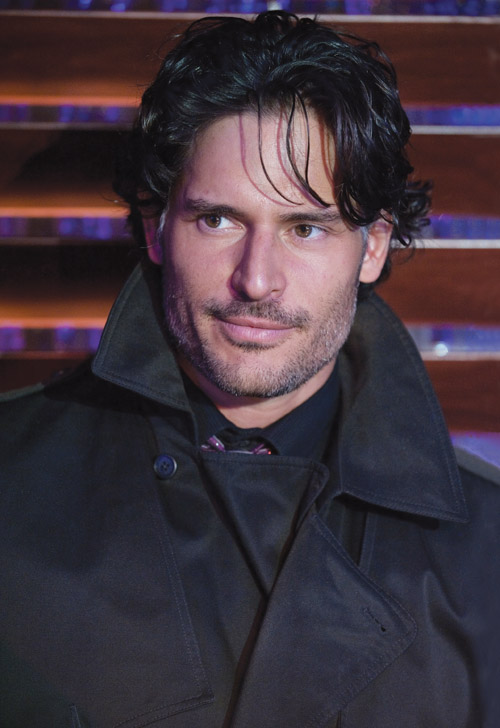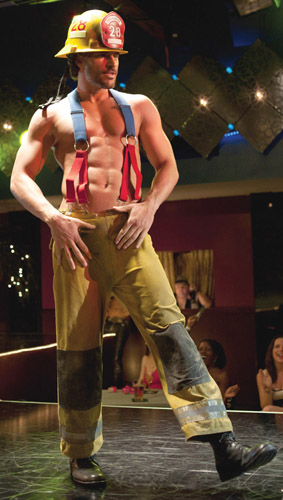
Joe My God!

An interview with ‘True Blood’ and ‘Magic Mike’ star Joe Manganiello
by Gregg Shapiro
Before you ask, yes, actor Joe Manganiello really is that stunning in person—tall and tan, with sculpted facial features, important hair, and shoulders broad enough to carry the weight of the world. He’s also smart, with a great sense of humor, making him a pleasure to interview. Perhaps best known as werewolf Alcide in HBO’s True Blood series, Manganiello plays exotic dancer Big Dick Richie in Steven Soderbergh’s indie male stripper film Magic Mike. Richie is the strong silent type—and if you looked the way he does, you wouldn’t need to say much, either. By just walking out on stage he sets tongues to wagging, mouths to watering, and hearts to racing. Manganiello was in Chicago at the Waldorf Astoria to talk about Magic Mike last month.
Gregg Shapiro: Joe, what was it about the character of Big Dick Richie that made you want to play him in Magic Mike?
Joe Manganiello: Besides the name? [Laughs] And the legacy that would come along with the name? I read the script and it was like scene-stealing moment after scene-stealing moment, between the fireman suit, the gold body paint, the silhouette routine, the penis pump. That, and then of course [director] Steven Soderbergh, Chan [Channing Tatum], [Matthew] McConaughey, and my drama school classmate Matt Bomer. It was a slam-dunk.
The first time the audience sees you backstage, you are seated at a sewing machine, working on your costume.
I’m sewing my gold thong.
Was that your first time behind a sewing machine, or do you have some familiarity with the equipment?
Yeah, I have familiarity. We had a Home-Ec class in junior high, so I knew my way around a sewing machine. But interestingly enough, I was a two-pack-a-day smoker before I quit for 7½ years. I worked for Camel. So I’ve got a cigarette [in that scene] and I’m actually wearing my own glasses. I wanted it to have this sweatshop feel. I thought it would be funny if I had to put the glasses on to see the sewing machine.
 Out of all of Richie’s various costumes—you mentioned the fireman—is there one that you liked better than the rest?
Out of all of Richie’s various costumes—you mentioned the fireman—is there one that you liked better than the rest?
The gold body paint was epic. When am I ever going to do that again? It took a good solid hour, with five people applying this makeup to every crevice. I had to be covered in gold. [I decided after going] through all of that, I’m going to make this thing memorable.
Was it itchy?
No. We did three takes, I think. Steven left the music on for about five minutes. So it was me as this gold statue come to life, just mauling a floor full of women, knocking tables over, jumping on things, lining them up. It was a Dionysian orgy—I rubbed up on everybody and I don’t remember my gold paint [coming off on anyone]. I think it stayed on me pretty well, which is kind of freaky to think about, actually.
In the pantheon of stripper movies, to my recollection there are only two Hollywood-style flicks about male strippers that precede Magic Mike—1981’s For Ladies Only starring Gregory Harrison, and 1983’s A Night in Heaven starring Christopher Atkins. Had you seen either or both of those movies before beginning work on Magic Mike, and if not, what was involved in your research for your role as Big Dick Richie?
I had not seen them. A really good long-time friend of mine was a male stripper in Dallas during the ‘90s at a club called LaBare. He was actually responsible for coming up with the fireman routine there. I took him out to lunch; we hung out. I had heard some of his stories before, but never had the amount of interest that I have now, obviously. I bought him lunch and took notes and laughed hysterically and got a really good feel for what he did. Plus, I’ve worked in clubs since I was 16 years old, so I know that life—I know those people.
Were you that tall at 16?
Yes.
So you were able to pass for older.
Yeah. Seagram’s hired me to be Captain Morgan for $25 an hour when I was 16. They didn’t really question it. We got a fake ID from somebody who was 10 years older, just to make sure I was covered. But interestingly enough, I was actually in Chicago when I was 21. I got a job that summer working for Finlandia Vodka. We wound up in Chicago promoting Finlandia during a Pride festival. I was wearing a tuxedo and they sent me into a bar with a tray of Finlandia vodka drinks. I don’t know if [that bar called The Manhole] still exists.
It’s now called Hydrate.
I ended up veering right into a back room with a metal spiderweb [laughs]—at 21, man! That was educational, I’ll just say that.
Do you feel like you learned anything about the male stripper world that you didn’t know before?
I think the differences and similarities between male and female strip clubs are fascinating, and it says a lot. [The main idea is that] men are threatening to women, but women aren’t threatening to men—so if women aren’t threatening to male strippers, let the women do whatever they want. When you go to a female strip club, you’re going to find that archetypal serial-killer man, sitting there quietly with his dollar bills, staring. [Laughs] You go to a male strip club and women are screaming, grabbing, groping—backstage, under the table, in the parking lot.
It seems like it’s a freer atmosphere.
You don’t really need security because every one of the guys is their own security. It’s “go for it, do your thing.” I think that’s why a lot of the guys are into it. Whereas for the women, it’s probably more about the money. For the guys, it’s more about the good time.
But the money doesn’t hurt.
Oh, sure, but these guys aren’t thinking about tomorrow. They’re not putting it away, generally. It’s enough to keep going, as long as there are drinks and drugs. It’s The Lost Boys. Also, I think with the men presenting themselves as female fantasies in costumes, and the nature of the theatrics, it’s more fun.
You mentioned working with director Steven Soderbergh, which elevates Magic Mike above your typical movie about strippers. What was it like to work with Steven?
He’s a very intuitive filmmaker. He trusts his gut. I think what that equates to is that he’s very present and in the moment as a filmmaker. It’s possible because he’s his own cameraman; he sees it in his head. What that allows him to do is observe what’s going on in front of him and make judgment calls based upon “Is what I’m seeing more interesting than maybe what we were going to shoot? If so, then maybe we should shoot that.” What happens is, you get there, you have a plan, then Steven will take it in whatever direction he wants and the result is something really fresh that has this electricity to it. You have to know the world. You have to know your character. Everything in the locker-room scene came out of us messing around, waiting for Steven to set up the shot. He’d say, “Let’s shoot that. This is great, this is funny.” It just so happened that the casting was right and there was this great group of guys who played off of each other really well. It added a whole other movie within the movie [that hadn’t been there before].
Mike [played by Channing Tatum] takes The Kid [Alex Pettyfer] under his wing, becoming his mentor. Have you ever had occasion to be a mentor to someone or be mentored by someone?
Yes. I’m an athlete, so I had coaches from the time I was little, all the way up. Not including my father, who also taught me all kinds of stuff. From father into the hands of coaches growing up. I’ve had different trainers—a trainer in high school, and I have a trainer now. I’m not somebody who’s afraid to ask for help or seek help out. And of course I definitely still check in with acting teachers from college—people who help to guide you into this chosen profession. They’ve had me back to the school to speak and do things, and I’m involved with the alumni.
You mentioned your old friend Matt Bomer, who plays Ken in Magic Mike, who recently came out as a gay man. Do you think that will have an impact on Magic Mike’s appeal to the gay community, or do you think the subject matter alone will be enough to bring your and his gay fans into the theaters?
I think Matt’s a brilliant actor, that’s what it is. Matt’s one of the best-looking guys on the planet and he’s one of the best actors on the planet. I think that’s the draw. I certainly think this movie appeals to that demographic, regardless. [Laughs]
Joe, what is next for you?
I have to fly back to L.A. to finish shooting the finale of True Blood. And then I’ll shoot an independent called Tumble Down with Rose Byrne and Jason Sudeikis.
Is it a comedy?
It’s kind of a slice of life that takes place in Maine, which is where I spent every summer growing up around those people. So it will be fun to get in there and mix it up.
Gregg Shapiro is a regular contributor to OutSmart magazine.










